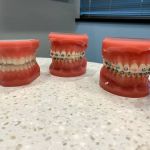How to Care for Your Gums and Prevent Recession
Taking care of your gums is an essential part of maintaining your overall oral health. We often focus on brushing our teeth, but we might overlook our gums, which play a critical role in supporting our teeth. Gums are like the foundation of a house, providing stability and support. When gum recession occurs, it can lead to tooth sensitivity, an increased risk of cavities, and, in severe cases, tooth loss. So, how do we keep our gums healthy and prevent them from receding? In this article, I’ll walk you through the importance of gum care and how to prevent gum recession, offering useful tips that can make a significant difference in your oral health.
1. Why Gum Health is So Important
Our gums are vital to the health of our entire mouth. They not only provide support to our teeth but also protect the bone structure that holds the teeth in place. When our gums are healthy, they form a tight seal around our teeth, keeping harmful bacteria away and preventing infection. However, when gums recede, the protective seal weakens, exposing the tooth roots and making them more vulnerable to decay and sensitivity. This is why it’s crucial to take steps to prevent gum recession and maintain strong, healthy gums.
2. Understanding Gum Recession
Gum recession occurs when the gum tissue that surrounds the teeth pulls back, exposing more of the tooth or even the tooth's root. This condition can develop gradually and often goes unnoticed in the early stages. It’s usually a result of poor oral hygiene, aggressive brushing, genetics, or other factors like smoking or gum disease. Receding gums can lead to discomfort, tooth sensitivity, and, in the long run, tooth loss. In addition, it can make teeth appear longer than usual, which might be concerning aesthetically.
3. Best Practices for Preventing Gum Recession
Now that we know the importance of healthy gums and the risks associated with gum recession, let’s dive into some practical steps you can take to prevent this condition from developing.
3.1 Proper Brushing Technique
One of the most common causes of gum recession is brushing your teeth too aggressively. You might think that brushing harder removes more plaque, but this is not true. In fact, brushing too hard can cause gum tissue to wear away over time. To prevent this, use a soft-bristled toothbrush and brush your teeth gently in small circular motions. Avoid brushing back and forth with excessive force, as this can harm both your gums and enamel.
3.2 Flossing Regularly
Flossing is just as important for gum health as brushing. It helps remove plaque and food particles from between your teeth and along the gumline, where your toothbrush can't reach. If left untreated, plaque can lead to gum disease and gum recession. Make sure to floss daily, using gentle motion to avoid injuring your gums.
3.3 Use a Mouthwash
Using an antibacterial mouthwash can help reduce the buildup of bacteria along the gumline, which is crucial in preventing gum disease. Look for mouthwashes that are alcohol-free, as alcohol can dry out your mouth and contribute to gum irritation. A good mouthwash can also freshen your breath and provide an extra layer of protection against harmful bacteria.
3.4 Regular Dental Check-ups
Visiting your dentist regularly is essential for preventing gum issues. During a dental check-up, your dentist will examine the health of your gums and can detect early signs of gum recession or gum disease. Professional cleanings are also important as they remove tartar buildup that can’t be eliminated through regular brushing and flossing. Your dentist might also provide personalized recommendations based on your unique oral health needs.
4. Lifestyle Changes to Support Gum Health
Your lifestyle choices can have a significant impact on the health of your gums. Here are a few changes you can make to support your gum health:
4.1 Stop Smoking
Smoking is a major contributor to gum disease and can lead to gum recession. It weakens your immune system, making it harder for your body to fight off infections in the gums. Smokers are also at a higher risk of developing plaque and tartar buildup, which can lead to gum disease. Quitting smoking not only benefits your gums but also improves your overall health.
4.2 Eat a Balanced Diet
A healthy diet plays a crucial role in maintaining strong gums. Foods rich in vitamins, especially vitamin C, can help maintain gum health and support the healing of gum tissue. Avoid excessive sugar, as it can contribute to plaque buildup and increase your risk of gum disease. Drinking plenty of water also helps to keep your gums hydrated and flush out harmful bacteria.
4.3 Manage Stress
Stress can affect your gum health in unexpected ways. It can lead to behaviors like teeth grinding or clenching, which can put extra pressure on your gums and cause them to recede. Additionally, chronic stress weakens your immune system, making it more difficult for your body to fight off infections. Practice stress management techniques like meditation, exercise, or mindfulness to support your gum health.
5. My Personal Story: How I Took Control of My Gum Health
Let me share a personal story about how I once struggled with gum health and how I turned it around. A few years ago, I noticed that my gums were receding. At first, I didn’t pay much attention to it, thinking it was just a natural part of aging. However, I started experiencing tooth sensitivity, and the appearance of my smile began to change. I decided to visit my dentist, who explained that my aggressive brushing habits and lack of proper flossing were contributing to the problem.
My dentist gave me a personalized plan to care for my gums, including a softer toothbrush, a change in my brushing technique, and daily flossing. Over time, I saw significant improvement. My gums became healthier, and the sensitivity in my teeth lessened. This experience taught me the importance of taking care of my gums, and I want to share what I’ve learned with others to prevent gum recession from becoming a problem in the first place.
6. Conclusion
Taking care of your gums is just as important as caring for your teeth. By adopting the right brushing and flossing habits, maintaining regular dental check-ups, and making healthy lifestyle choices, you can significantly reduce your risk of gum recession. If you’re already experiencing gum recession, it’s not too late to take action and improve your gum health. Consult your dentist for a personalized treatment plan and keep your gums in top shape for years to come.







 Atwood Aaron DDS3.0 (18 review)
Atwood Aaron DDS3.0 (18 review) High Point Dentistry4.0 (1675 review)
High Point Dentistry4.0 (1675 review) Children's Dental FunZone - Pediatric Dentist - Fontana4.0 (1496 review)
Children's Dental FunZone - Pediatric Dentist - Fontana4.0 (1496 review) Dr Donnelly Patrick5.0 (43 review)
Dr Donnelly Patrick5.0 (43 review) Gladwell Orthodontics4.0 (253 review)
Gladwell Orthodontics4.0 (253 review) Nathan Satler, DDS4.0 (64 review)
Nathan Satler, DDS4.0 (64 review) The Importance of Oral Health Education During Pregnancy for a Healthy Pregnancy
The Importance of Oral Health Education During Pregnancy for a Healthy Pregnancy Best Tips for Brushing Your Teeth Properly for Healthy Gums: Essential Techniques for Oral Health
Best Tips for Brushing Your Teeth Properly for Healthy Gums: Essential Techniques for Oral Health Why Skipping Dental Checkups Can Lead to Bigger Oral Health Problems
Why Skipping Dental Checkups Can Lead to Bigger Oral Health Problems Advantages of Porcelain Dental Restorations
Advantages of Porcelain Dental Restorations How Can Diabetes Cause Tooth and Gum Problems? Preventing and Managing Oral Health Issues
How Can Diabetes Cause Tooth and Gum Problems? Preventing and Managing Oral Health Issues Healthy Habits for Promoting Good Oral Health and Hygiene: Tips for a Healthy Smile
Healthy Habits for Promoting Good Oral Health and Hygiene: Tips for a Healthy Smile